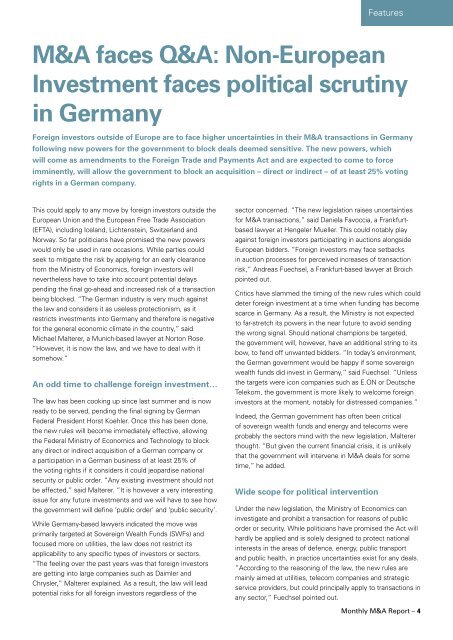Monthly M&A Insider - Mergermarket
Monthly M&A Insider - Mergermarket
Monthly M&A Insider - Mergermarket
You also want an ePaper? Increase the reach of your titles
YUMPU automatically turns print PDFs into web optimized ePapers that Google loves.
This could apply to any move by foreign investors outside the<br />
European Union and the European Free Trade Association<br />
(EFTA), including Iceland, Lichtenstein, Switzerland and<br />
Norway. So far politicians have promised the new powers<br />
would only be used in rare occasions. While parties could<br />
seek to mitigate the risk by applying for an early clearance<br />
from the Ministry of Economics, foreign investors will<br />
nevertheless have to take into account potential delays<br />
pending the final go-ahead and increased risk of a transaction<br />
being blocked. “The German industry is very much against<br />
the law and considers it as useless protectionism, as it<br />
restricts investments into Germany and therefore is negative<br />
for the general economic climate in the country,” said<br />
Michael Malterer, a Munich-based lawyer at Norton Rose.<br />
“However, it is now the law, and we have to deal with it<br />
somehow.”<br />
An odd time to challenge foreign investment…<br />
The law has been cooking up since last summer and is now<br />
ready to be served, pending the final signing by German<br />
Federal President Horst Koehler. Once this has been done,<br />
the new rules will become immediately effective, allowing<br />
the Federal Ministry of Economics and Technology to block<br />
any direct or indirect acquisition of a German company or<br />
a participation in a German business of at least 25% of<br />
the voting rights if it considers it could jeopardise national<br />
security or public order. “Any existing investment should not<br />
be affected,” said Malterer. “It is however a very interesting<br />
issue for any future investments and we will have to see how<br />
the government will define ‘public order’ and ‘public security’.<br />
While Germany-based lawyers indicated the move was<br />
primarily targeted at Sovereign Wealth Funds (SWFs) and<br />
focused more on utilities, the law does not restrict its<br />
applicability to any specific types of investors or sectors.<br />
“The feeling over the past years was that foreign investors<br />
are getting into large companies such as Daimler and<br />
Chrysler,” Malterer explained. As a result, the law will lead<br />
potential risks for all foreign investors regardless of the<br />
Features<br />
M&A faces Q&A: Non-European<br />
Investment faces political scrutiny<br />
in Germany<br />
Foreign investors outside of Europe are to face higher uncertainties in their M&A transactions in Germany<br />
following new powers for the government to block deals deemed sensitive. The new powers, which<br />
will come as amendments to the Foreign Trade and Payments Act and are expected to come to force<br />
imminently, will allow the government to block an acquisition – direct or indirect – of at least 25% voting<br />
rights in a German company.<br />
sector concerned. “The new legislation raises uncertainties<br />
for M&A transactions,” said Daniela Favoccia, a Frankfurtbased<br />
lawyer at Hengeler Mueller. This could notably play<br />
against foreign investors participating in auctions alongside<br />
European bidders. “Foreign investors may face setbacks<br />
in auction processes for perceived increases of transaction<br />
risk,” Andreas Fuechsel, a Frankfurt-based lawyer at Broich<br />
pointed out.<br />
Critics have slammed the timing of the new rules which could<br />
deter foreign investment at a time when funding has become<br />
scarce in Germany. As a result, the Ministry is not expected<br />
to far-stretch its powers in the near future to avoid sending<br />
the wrong signal. Should national champions be targeted,<br />
the government will, however, have an additional string to its<br />
bow, to fend off unwanted bidders. “In today’s environment,<br />
the German government would be happy if some sovereign<br />
wealth funds did invest in Germany,” said Fuechsel. “Unless<br />
the targets were icon companies such as E.ON or Deutsche<br />
Telekom, the government is more likely to welcome foreign<br />
investors at the moment, notably for distressed companies.”<br />
Indeed, the German government has often been critical<br />
of sovereign wealth funds and energy and telecoms were<br />
probably the sectors mind with the new legislation, Malterer<br />
thought. “But given the current financial crisis, it is unlikely<br />
that the government will intervene in M&A deals for some<br />
time,” he added.<br />
Wide scope for political intervention<br />
Under the new legislation, the Ministry of Economics can<br />
investigate and prohibit a transaction for reasons of public<br />
order or security. While politicians have promised the Act will<br />
hardly be applied and is solely designed to protect national<br />
interests in the areas of defence, energy, public transport<br />
and public health, in practice uncertainties exist for any deals.<br />
”According to the reasoning of the law, the new rules are<br />
mainly aimed at utilities, telecom companies and strategic<br />
service providers, but could principally apply to transactions in<br />
any sector,” Fuechsel pointed out.<br />
<strong>Monthly</strong> M&A Report – 4




![mergermarket [TITLE OF RELEASE TO GO HERE] 3 January 2013 ...](https://img.yumpu.com/11701841/1/190x135/mergermarket-title-of-release-to-go-here-3-january-2013-.jpg?quality=85)












